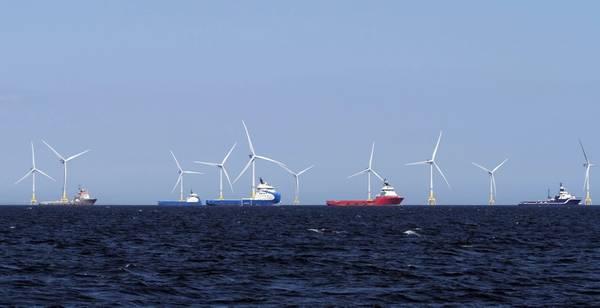
As momentum behind decarbonization accelerates, offshore service providers must accept the challenges ahead with great enthusiasm, harnessing key skills honed during many years working offshore, says William Hill, Executive Group Vice President, GAC Energy.
The enforced shutdown of much of the industrialized world in response to the COVID-19 pandemic has thrown into sharp contrast the state of the environment before and after production, transportation and travel were dramatically cut back. The carbon footprints of large Chinese cities dropped drastically after measures were brought in to control the spread of the virus. Emissions of carbon monoxide in New York dropped by nearly 50% compared to last year. Dolphins were spotted swimming in the newly clear waters of Venice.
But pollution could return to pre-pandemic levels, or more, once the world gets back to ‘business as usual’. And that is highlighting the need to develop and harvest sustainable energy to drive our world.
A catalyst for change
If we are smart, we can emerge stronger from the COVID-19 crisis by using it as a catalyst for change. It is an opportunity to further sharpen the focus on renewable power to help the global energy industry recover from the inevitable economic downturn, adapting expertise previously used for fossil fuels to wind and wave generation.
The oil and gas industry is already keenly aware of the decarbonization challenge and the changes it must make to support the new energy mix. Statoil led the charge, rebranding themselves as Equinor – a move at the time that was motivated by “the company’s strategy and development as a broad energy company”. Since then, BP has followed suit, committing to net zero by 2050 with an ambition to “reimagine energy for people and our planet”.
While the shift to renewable power has been coming for a long time, there is now more appetite for change than ever before. Service providers that support the offshore sector must embrace the challenge to continue to run profitably and efficiently.
Offshore optimism
The skills that underpin the offshore oil and gas industry also support the wider offshore industry, including projects to generate renewable energy. Offshore support vessels (OSVs), for example, serve essentially the same role for offshore wind farms as they do for oil and gas rigs: seismic surveys, crew transportation, offshore living quarters and the provision of offshore supply houses for equipment and tools.
It takes an average of three to five years to get a new offshore wind turbine up, running and generating power. It’s clear, therefore, that such renewable projects can provide longer-term contracts to support operators looking to diversify from oil and gas. However, they must be prepared for what lies ahead. Heightened customer expectations, particularly driven by the current economic situation, throw down a gauntlet for suppliers to add value and prove they are up to the task - whether it is handling huge equipment moves or delivering orders of small but essential parts - with speed and efficiency.
Powering new mindsets
Tough times spark innovation. This has already been seen worldwide in recent weeks with companies across a range of industries diversifying their efforts to manufacture protective equipment and ventilators to fight COVID-19. That shift in thinking today could lead to new approaches in the mainstream energy industry. Offshore service providers have something of a head start, having already spent the past decade driving and responding to innovations within the markets they serve.
Data plays a key role in that switch to a new mindset, as the intelligence and insight it provides serves as a key element in informed business decision-making.
Digital transition will go hand in hand with decarbonization, enhancing relationships between suppliers and customers. For example, real-time reporting is now a standard expectation – weekly or monthly reports are no longer enough. That demands an investment in digital infrastructure and transparency to match.
Redoubling our resolve
Just a few short months ago, 2020 was expected to mark a turning point for climate and sustainable development, the start of a decade of action. COVID-19 has thrown something of a spanner into the works, creating an unexpected situation beyond our control that will have significant and far reaching consequences for years to come.
What we can control, however, is the way we react longer term as an industry. If the offshore sector responds in a thoughtful and holistic way, there is a real opportunity to drive and support energy transition, adapting skills honed over decades for oil and gas to the needs of wind and wave projects. It’s an exciting prospect, and we look forward to redoubling our resolve to support the fight against climate change, and a better energy mix for our planet.



